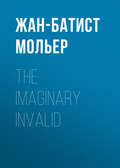
Мольер (Жан-Батист Поклен)
The Love-Tiff
SCENE VIII. – METAPHRASTUS, alone
Hence comes very properly that saying of a philosopher, "Speak, that I may know thee." Therefore, if the liberty of speaking is taken from me, I, for my part, would as soon be divested of my humanity, and exchange my being for that of a brute. I shall have a headache for a week. Oh! how I detest these eternal talkers! But if learned men are not listened to, if their mouths are for ever to be stopped, then the order of events must be changed; the hens in a little time will devour the fox; young children teach old men; little lambs take a delight in pursuing the wolf; fools make laws; women go to battle; judges be tried by criminals; and masters whipped by pupils; a sick man prescribe for a healthy one; a timorous hare…
SCENE IX. – ALBERT, METAPHRASTUS
(Albert rings a bell in the ears of Metaphrastus, and drives him off).
MET. Mercy on me! Help! help!
* * * * *
ACT III
SCENE I. – MASCARILLE, alone
Heaven sometimes favours a bold design; we must get out of a bad business as well as we can. As for me, after having imprudently talked too much, the quickest remedy I could employ was to go on in the same way, and immediately to tell to our old master the whole intrigue. His son is a giddy-brained mortal, who worries me; but if the other tells what I have discovered to him, then I had better take care, for I shall get a beating. However, before his fury can be kindled, some lucky thing may happen to us, and the two old men may arrange the business between themselves. That is what I am going to attempt; without losing a moment I must, by my master's order, go and see Albert. (Knocks at Albert's door).
SCENE II. – ALBERT, MASCARILLE
ALB. Who knocks?
MASC. A friend.
ALB. What brings you hither, Mascarille?
MASC. I come, sir, to wish you good-morning.
ALB. Hah! you really take a great deal of pains. Good-morning, then, with all my heart. (He goes in).
MASC. The answer is short and sweet. What a blunt old fellow he is. (Knocks).
ALB. What, do you knock again?
MASC. You have not heard me, sir.
ALB. Did you not wish me good-morning?
MASC. I did.
ALB. Well, then, good morning I say. (Is going; Mascarille stops him).
MASC. But I likewise come to pay Mr. Polydore's compliments to you.
ALB. Oh! that is another thing. Has your master ordered you to give his compliments to me?
MASC. Yes.
ALB. I am obliged to him; you may go; tell him I wish him all kind of happiness. (Exit).
MASC. This man is an enemy to all ceremony. (Knocks). I have not finished, sir, giving you his whole message; he has a favour to request of you.
ALB. Well, whenever he pleases, I am at his service.
MASC. (Stopping him). Stay, and allow me to finish in two words. He desires to have a few minutes' conversation with you about an important affair, and he will come hither.
ALB. Hey! what affair can that be which makes him wish to have some conversation with me?
MASC. A great secret, I tell you, which he has but just discovered, and which, no doubt, greatly concerns you both. And now I have delivered my message.
SCENE III. – ALBERT, alone
ALB. Righteous Heavens! how I tremble! Polydore and I have had little acquaintance together; my designs will all be overthrown; this secret is, no doubt, that of which I dread the discovery. They have bribed somebody to betray me; so there is a stain upon my honour which can never be wiped off. My imposture is found out. Oh! how difficult it is to keep the truth concealed for any length of time! How much better would it have been for me and my reputation had I followed the dictates of a well-founded apprehension! Many times and oft have I been tempted to give up to Polydore the wealth I withhold from him, in order to prevent the outcry that will be raised against me when everything shall be known, and so get the whole business quietly settled. But, alas! it is now too late, the opportunity is gone, and this wealth, which wrongfully came into my family, will be lost to them, and sweep away the greatest part of my own property with it.
SCENE IV. – ALBERT, POLYDORE
POL. (Not seeing Albert). To be married in this fashion, and no one knowing anything about it! I hope it may all end well! I do not know what to think of it; I much fear the great wealth and just anger of the father. But I see him alone.
ALB. Oh, Heavens! yonder comes Polydore.
POL. I tremble to accost him.
ALB. Fear keeps me back.
POL. How shall I begin?
ALB. What shall I say?
POL. He is in a great passion.
ALB. He changes colour.
POL. I see, Signor Albert, by your looks, that you know already what brings me hither.
ALB. Alas! yes.
POL. The news, indeed, may well surprise you, and I could scarcely believe what I was told just now.
ALB. I ought to blush with shame and confusion.
POL. I think such an action deserves great blame, and do not pretend to excuse the guilty.
ALB. Heaven is merciful to miserable sinners.
POL. You should bear this in mind.
ALB. A man ought to behave as a Christian.
POL. That is quite right.
ALB. Have mercy; for Heaven's sake, have mercy, Signor Polydore.
POL. It is for me to implore it of you.
ALB. Grant me mercy; I ask it on my bended knees.
POL. I ought to be in that attitude rather than you.
[Footnote: The two old men are kneeling opposite to one another.]
ALB. Pity my misfortune.
POL. After such an outrage I am the postulant.
ALB. Your goodness is heart-rending.
POL. You abash me with so much humility.
ALB. Once more, pardon.
POL. Alas! I crave it of you.
ALB. I am extremely sorry for this business.
POL. And I feel it greatly.
ALB. I venture to entreat you not to make it public.
POL. Alas, Signor Albert, I desire the very same.
ALB. Let us preserve my honour.
POL. With all my heart.
ALB. As for money, you shall determine how much you require.
POL. I desire no more than you are willing to give; you shall be the master in all these things, I shall be but too happy if you are so.
ALB. Ha! what a God-like man! how very kind he is!
POL. How very kind you are yourself, and that after such a misfortune.
ALB. May you be prosperous in all things!
POL. May Heaven preserve you!
ALB. Let us embrace like brothers.
POL. With all my heart! I am overjoyed that everything has ended so happily,
ALB. I thank Heaven for it.
POL. I do not wish to deceive you; I was afraid you would resent that Lucile has committed a fault with my son; and as you are powerful, have wealth and friends…
ALB. Hey! what do you say of faults and Lucile?
POL. Enough, let us not enter into a useless conversation. I own my son is greatly to blame; nay, if that will satisfy you, I will admit that he alone is at fault; that your daughter was too virtuous, and would never have taken a step so derogatory to honour, had she not been prevailed upon by a wicked seducer; that the wretch has betrayed her innocent modesty, and thus frustrated all your expectations. But since the thing is done, and my prayers have been granted, since we are both at peace and amity, let it be buried in oblivion, and repair the offence by the ceremony of a happy alliance.
ALB. (Aside). Oh, Heavens! what a mistake I have been under! What do I hear? I get from one difficulty into another as great. I do not know what to answer amidst these different emotions; if I say one word, I am afraid of betraying myself.
POL. What are you thinking of, Signor Albert?
ALB. Of nothing. Let us put off our conversation for a while, I pray you. I have become suddenly very unwell, and am obliged to leave you.
SCENE V. – POLYDORE, alone
I can look into his soul and discover what disturbs him; though he listened to reason at first, yet his anger is not quite appeased. Now and then the remembrance of the offence flashes upon him; he endeavours to hide his emotion by leaving me alone. I feel for him, and his grief touches me. It will require some time before he regains his composure, for if sorrow is suppressed too much, it easily becomes worse. O! here comes my foolish boy, the cause of all this confusion.
SCENE VI. – POLYDORE, VALÈRE
POL. So, my fine fellow, shall your nice goings-on disturb your poor old father every moment? You perform something new every day, and we never hear of anything else.
VAL. What am I doing every day that is so very criminal? And how have I deserved so greatly a father's wrath?
POL. I am a strange man, and very peculiar to accuse so good and discreet a son. He lives like a saint, and is at prayers and in the house from morning to evening. It is a great untruth to say that he perverts the order of nature, and turns day into night! It is a horrible falsehood to state that upon several occasions he has shown no consideration for father or kindred; that very lately he married secretly the daughter of Albert, regardless of the great consequences that were sure to follow; they mistake him for some other! The poor innocent creature does not even know what I mean! Oh, you villain! whom Heaven has sent me as a punishment for my sins, will you always do as you like, and shall I never see you act discreetly as long as I live? (Exit).
VAL. (Alone, musing). Whence comes this blow? I am perplexed, and can find none to think of but Mascarille, he will never confess it to me; I must be cunning, and curb my well-founded anger a little.
SCENE VII. – VALÈRE, MASCARILLE
VAL. Mascarille, my father whom I just saw knows our whole secret.
MASC. Does he know it?
VAL. Yes.
MASC. How the deuce could he know it?
VAL. I do not know whom to suspect; but the result has been so successful, that I have all the reason in the world to be delighted. He has not said one cross word about it; he excuses my fault, and approves of my love; I would fain know who could have made him so tractable. I cannot express to you the satisfaction it gives me.
MASC. And what would you say, sir, if it was I who had procured you this piece of good luck?
VAL. Indeed! you want to deceive me.
MASC. It is I, I tell you, who told it to your father, and produced this happy result for you.
VAL. Really, without jesting?
MASC. The devil take me if I jest, and if it is not as I tell you.
VAL. (Drawing his sword). And may he take me if I do not this very moment reward you for it.
MASC. Ha, sir! what now? Don't surprise me.
VAL. Is this the fidelity you promised me? If I had not deceived you, you would never have owned the trick which I rightly suspected you played me. You rascal! your tongue, too ready to wag, has provoked my father's wrath against me, and utterly ruined me. You shall die without saying another word.
MASC. Gently; my soul is not in a fit condition to die. I entreat you, be kind enough to await the result of this affair. I had very good reasons for revealing a marriage which you yourself could hardly conceal. It was a masterpiece of policy; you will not find your rage justified by the issue. Why should you get angry if, through me, you get all you desire, and are freed from the constraint you at present lie under?
VAL. And what if all this talk is nothing but moonshine?
MASC. Why, then, it will be time enough to kill me; but my schemes may perchance succeed. Heaven will assist his own servants; you will be satisfied in the end, and thank me for my extraordinary management.
VAL. Well, we shall see. But Lucile…
MASC. Hold, here comes her father
SCENE VIII. – ALBERT, VALÈRE, MASCARILLE
ALB. (Not seeing Valère). The more I recover from the confusion into which I fell at first, the more I am astonished at the strange things Polydore told me, and which my fear made me interpret in so different a manner to what he intended. Lucile maintains that it is all nonsense, and spoke to me in such a manner as leaves no room for suspicion… Ha! sir, it is you whose unheard-of impudence sports with my honour, and invents this base story?
MASC. Pray, Signor Albert, use milder terms, and do not be so angry with your son-in-law.
ALB. How! son-in-law, rascal? You look as if you were the main-spring of this intrigue, and the originator of it.
MASC. Really I see no reason for you to fly in such a passion.
ALB. Pray, do you think it right to take away the character of my daughter, and bring such a scandal upon a whole family?
MASC. He is ready to do all you wish.
ALB. I only want him to tell the truth. If he had any inclination for Lucile, he should have courted her in an honourable and open way; he should have acted as he ought, and asked her father's leave; and not have had recourse to this cowardly contrivance, which offends modesty so much.
MASC. What! Lucile is not secretly engaged to my master?
ALB. No, rascal, nor ever will be.
MASC. Not quite so fast! If the thing is already done, will you give your consent to ratify that secret engagement?
ALB. And if it is certain that it is not so, will you have your bones broken?
VAL. It is easy, sir, to prove to you that he speaks the truth.
ALB. Good! there is the other! Like master, like man. O! what impudent liars!
MASC. Upon the word of a man of honour, it is as I say.
VAL. Why should we deceive you?
ALB. (Aside) They are two sharpers that know how to play into each other's hands.
MASC. But let us come to the proof, and without quarrelling. Send for Lucile, and let her speak for herself.
ALB. And what if she should prove you a liar?
MASC. She will not contradict us, sir; of that I am certain. Promise to give your consent to their engagement; and I will suffer the severest punishment if, with her own mouth, she does not confess to you that she is engaged to Valère, and shares his passion.
ALB. We shall see this presently. (He knocks at his door).
MASC. (To Valère). Courage, Sir; all will end well.
ALB. Ho! Lucile, one word with you.
VAL. (To Mascarille), I fear…
MASC. Fear nothing.







